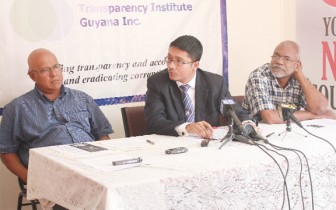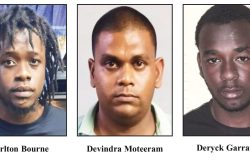-transparency institute calls for urgent appointment of oversight bodies
Guyana remains among countries rated as having a serious corruption problem in the latest Transparency International Corruption Perceptions Index (CPI), prompting the local watchdog body to urge the overdue appointment of key oversight bodies and the strengthening of those already in place but too weak to tackle white-collar crime.
With a score of 28 out of 100 points, Guyana ranks 133 out of 176 countries surveyed for the 2012 CPI, which was released yesterday, and it has ranked worse than every other country in the Caribbean except for Haiti.
Using an updated methodology this year, the CPI measures perceived levels of public sector corruption, on a scale from 0 (perceived to be highly corrupt) to 100 (perceived to be very clean) and any score below 50 indicates a serious problem. Two-thirds of the countries surveyed scored below 50.
Among Caribbean territories, Barbados led with a score of 76, followed by The Bahamas and St Lucia 71, St Vincent and the Grenadines 62, Dominica 58, Trinidad and Tobago 39, Jamaica 38 and Suriname 37. Haiti, which has also traditionally been one of the worst performers, scored 19.
With this year’s findings that corruption remains a serious problem, President of the Transparency Institute Guyana Inc (TIGI) attorney Gino Persaud called yesterday for the urgent appointment of an Integrity Commission, with members who are competent and independent enough to scrutinize the financial disclosures of politicians and bureaucrats and with adequate staffing and resources to adequately fulfil its mandate. He reminded that Prime Minister Samuel Hinds had declared in June that new members of the Integrity Commission could be sworn in within a week’s time.
Persaud also called for the urgent appointment of members of the long-delayed Public Procurement Commission to provide independent oversight of public procurement and to minimize government’s involvement in the process. He stated that the constitution was amended in 2001 to make provision for the commission but this has been honoured in the breach.

TIGI is also urging that laws be implemented to regulate election campaign financing within a statutory regulatory scheme, governing political parties and accountability for political parties; for the implementation of modern anti-corruption legislation and whistle-blowing legislation; for the enforcement of existing anti-corruption laws by investigating and prosecuting the corrupt; and for the strengthening of existing anti-corruption institutions, such as the Guyana Police Force and the Financial Intelligence Unit established under the anti-money laundering legislation. “The institutions are weak and unable to counter serious white-collar crime and corrupt activities,” Persaud said.
Persaud also called for the appointment of an Ombudsman to address grievances from members of the public; for all public moneys to be placed to the credit of the Consolidated Fund and for no public expenditure to be incurred without parliamentary approval; for appointments to public offices to be advertised and made with due regard to technical competence; and for the Access to Information legislation passed in parliament to be strengthened and made operational. “Although passed in parliament it is not yet in effect,” he pointed out.
Persaud said TIGI also wants a strengthened civil society and for organisations such as the Guyana Bar Association, the Institute of Chartered Accountants of Guyana, the Private Sector Commission, the Georgetown Chamber of Commerce and Industry, and the Guyana Press Association to become more involved in combating corruption by speaking out against it and being more proactive within its own membership on tackling the problem.
He added that TIGI plans to increase efforts to address the corruption problem. “Some of the work we’ve planned, including trying to seek funding to help us to do our work, includes work in the areas of technical expertise to help elections campaigns, financing, etc. We are looking to do some work that can be presented to parliament… like presenting a draft bill is one of the goals we have to help push the process forward,” he explained.
Asked about TIGI’s views of President Donald Ramotar’s actions and whether it is believed that the Head of State understands the depth of the problem, Persaud said that the organisation was not put together to pass judgment on the President but only to serve to examine the issues. “We have definitively stated that we are disappointed in these institutions that are not appointed or that are effective partially and we intend to increase our efforts to make that public,” he added.
Conversation
Former Auditor General Anand Goolsarran, Vice-President of the TIGI, said that he believes since the non-governmental organisation came into existence two years ago, it has been able to raise the level of conversation on corruption. He added that when the results are evaluated, the developed countries are doing everything possible to get to the top of the table.
“We know that huge corporations who want to invest in countries are interested in the perceived levels of corruption and we know that they consult the index every year to see how countries rank and we’ve heard these from companies themselves,” Goolsarran pointed out when asked how Guyana’s ranking has affected the country in this regard.
With scores of 90, Denmark, Finland and New Zealand tied for first place on the CPI, which found there was strong access to the information system and rules governing the behaviour of those in public positions.
Afghanistan, North Korea and Somalia were at the bottom of the index and it was pointed out that in these countries, the lack of accountable leadership and effective public institutions underscore the need to take a much stronger stance against corruption.
“A growing outcry over corrupt governments forced several leaders from office last year, but as the dust has cleared it has become apparent that the levels of bribery, abuse of power and secret dealings are still very high in many countries,” Transparency International said in a statement on this year’s findings, which it said show corruption continues to ravage societies around the world and that public institutions need to be more transparent, and powerful officials more accountable.
“Governments need to integrate anti-corruption actions into all public decision-making. Priorities include better rules on lobbying and political financing, making public spending and contracting more transparent and making public bodies more accountable to people,” said Huguette Labelle, the Chair of Transparency International was quoted as saying in the statement.
“After a year of focus on corruption, we expect governments to take a tougher stance against the abuse of power. The Corruption Perceptions Index 2012 results demonstrate that societies continue to pay the high cost of corruption,” Labelle added.








